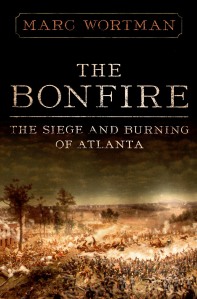 I finished up Mark Wortman’s The Bonfire: The Siege and Burning of Atlanta. Let me start off with a warning – this is possibly the most inappropriately titled book I’ve ever read. Unlike Russell Bonds’s War Like the Thunderbolt, and despite the claims of its title, Wortman’s book is most definitely not primarily concerned with the siege and burning of Atlanta. It’s more accurately described as a history of the city of Atlanta, from its wilderness days up through the climactic events of 1864.
I finished up Mark Wortman’s The Bonfire: The Siege and Burning of Atlanta. Let me start off with a warning – this is possibly the most inappropriately titled book I’ve ever read. Unlike Russell Bonds’s War Like the Thunderbolt, and despite the claims of its title, Wortman’s book is most definitely not primarily concerned with the siege and burning of Atlanta. It’s more accurately described as a history of the city of Atlanta, from its wilderness days up through the climactic events of 1864.
Look at it this way: Wortman’s story takes up 361 pages. John Bell Hood doesn’t take over command of the Army of Tennessee until page 259, and William T. Sherman marches out of the burning city on page 336. But this isn’t necessarily a bad thing. Bonfire is a social history first and foremost. And it compliments rather than competes with Thunderbolt. You’ll get more back story on the people and places in Bonfire, and more focus on a narrower timeframe in Thunderbolt.
I’m not a fan of Wortman’s writing style: as I’ve said before, I dig Hemingway, not Steinbeck, and so prefer fewer words to more. Wortman is heavy on the adjectives and uses so many compound sentences I found myself having to read a lot of them more than once. He’s at his weakest when he’s discussing military matters: Abraham Lincoln changed commanders of the Army of the Potomac two times in the first two years of the war, not five (from McClellan to Burnside and from Burnside to Hooker – that’s two. Neither McDowell nor Pope ever commanded the AotP, and McClellan organized it); the Army of the Cumberland was commanded by William Rosecrans, not William Rosencrans, and his army was attacked by that of Braxton Bragg at Chickamauga, not the other way around; Jefferson Davis placed Robert E. Lee in command of the army outside Richmond in 1862 because Joe Johnston was wounded, not because Lee was more aggressive. But the correction of these problems would not significantly alter the product, which again is not a military history. Of course, it does bring into question the accuracy of the non-military aspects of the book. But I’m having trouble getting fired up about that – I guess I’m mellowing in my old age.
Bonds’s writing style is more appealing to me, but that’s a matter of personal taste. The contents are so dissimilar that comparisons would be apples to oranges. I think the way to approach these books would be to start reading Wortman, then read the two in tandem when they synch up time-wise.













[…] relieved to see that they not only don’t repeat my topic, they enhance interest in the period. The Bonfire: The Siege and Burning of Atlanta is primarily a social history about Atlanta during the war and the war’s impact upon its […]
LikeLike